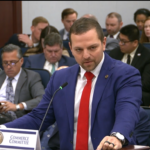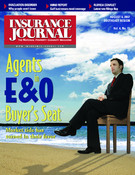Policyholder wind
“Maybe they’ll make us buy Shell gasoline next. For me to have fire insurance I have to buy wind insurance? That makes no sense at all.”
— Michael McAndrews of Ocean Springs, Fla., who objects to Allstate telling him it will not renew his homeowner’s fire and theft coverage next year unless he proves that he has wind insurance from another carrier. McAndrews planned to self-insure for wind damage.
Insurer wind
“If a customer chooses to not take that protection, they are at more of a risk. And we have to manage our risk. The individual policyholders we have make up our total risk in an area. It’s just more responsible for us to protect as many of our customers as we can and to continue to educate our customers so they are protected completely rather than partially.”
–Allstate spokesman Kate Hollcraft explaining the insurer’s position on requiring wind coverage of McAndrews and other insureds.
Consumer wind
“Allstate’s practices reflect the significant but not always highly visible changes that property/casualty insurers have made in recent years in the way they assess risk, set rates and manage claims. The aftermath of Hurricane Katrina exposed the harmful effects of many of these changes on policyholders, especially lower-income and minority consumers.”
— J. Robert Hunter, who heads the Consumer Federation of America, offering a different explanation of Allstate’s practice.
Federal wind
“Including wind coverage within the National Flood Insurance Program will create artificial subsidies, thereby essentially raising rates for consumers in inland parts of the country who are not subject to the same kind of wind-damage risks faced by policyholders on the coasts. It is hard to believe that Congress wants to give more responsibility to a failed government program. I wouldn’t invest in a company that had inadequate cash flow and $17.5 billion of debt.”
— Ben McKay, Property Casualty Insurers of America, opposing a House panel’s decision to add wind coverage to the federal flood program.
NBCR coverage
“NBCR (nuclear, biological, chemical, radioactive) raises far more concerns than does coverage for conventional terrorist attacks, ones that NAMIC continues to believe would be best considered through the creation of a commission to study the implications of an attack using NBCR weapons and the specifics of how best the nation can address the massive harm that such an attack would cause.”
— Carl Parks, the National Association of Mutual Insurance Companies, on one provision in the latest federal terrorism reinsurance act renewal.
Was this article valuable?
Here are more articles you may enjoy.


 Commercial P/C Market Softest Since 2017, Says CIAB
Commercial P/C Market Softest Since 2017, Says CIAB  Kyle Busch and Wife Settle Lawsuit With Pacific Life and Insurance Agent
Kyle Busch and Wife Settle Lawsuit With Pacific Life and Insurance Agent  Florida OIR Slams Committee-Approved Clearinghouse Bill Changes as ‘Illusory’
Florida OIR Slams Committee-Approved Clearinghouse Bill Changes as ‘Illusory’  Cuts to Funding Mean Risks Will Pivot in Human Services Market
Cuts to Funding Mean Risks Will Pivot in Human Services Market 


